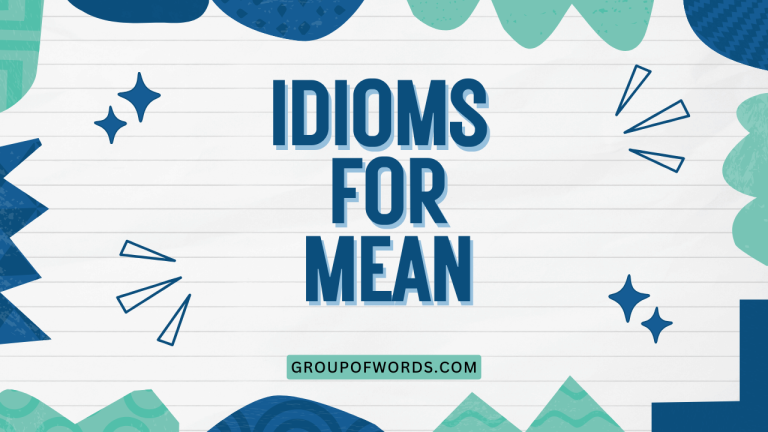Idioms for Amazing: Mastering English Expressions
English is full of colorful expressions, and idioms are among the most vibrant. When you want to express that something is truly amazing, using idioms can add flair and impact to your language.
This article will explore a variety of idioms that convey the meaning of “amazing,” providing you with the tools to enrich your vocabulary and speak more expressively. Whether you’re an English language learner or a native speaker looking to refine your communication skills, this guide will help you understand and use these idioms effectively.
This comprehensive guide is designed to provide you with a deep understanding of these idioms, their meanings, origins, and proper usage. By the end of this article, you will have a solid grasp of how to incorporate these idioms into your everyday conversations and writing.
Get ready to take your English to the next level!
Table of Contents
- Introduction
- Definition of Idioms for “Amazing”
- Structural Breakdown of Idioms
- Types and Categories of Idioms for “Amazing”
- Examples of Idioms for “Amazing”
- Usage Rules for Idioms
- Common Mistakes When Using Idioms
- Practice Exercises
- Advanced Topics in Idiomatic Usage
- Frequently Asked Questions
- Conclusion
Definition of Idioms for “Amazing”
An idiom is a phrase or expression whose meaning cannot be understood from the literal meanings of its individual words. Instead, it has a figurative meaning that is known through common usage.
Idioms for “amazing” are phrases used to describe something that is remarkably good, surprising, or impressive. These idioms add color and emphasis to your language, making your expressions more vivid and engaging.
The function of idioms for “amazing” is to elevate the description of something beyond a simple adjective like “good” or “impressive.” They provide a more nuanced and expressive way to convey feelings of awe, wonder, and admiration. These idioms are often used in informal contexts, but some can also be appropriate in more formal settings, depending on the specific idiom and the audience.
Idioms are context-dependent, meaning their appropriateness can change based on the situation. For example, saying something is “out of this world” might be perfect for describing a delicious dessert but less suitable for a serious business presentation.
Understanding the context in which to use these idioms is crucial for effective communication.
Structural Breakdown of Idioms
Idioms often defy traditional grammatical rules. Their structures are fixed, and you cannot usually change the words or their order without altering or losing the idiom’s meaning.
Understanding this rigidity is key to using idioms correctly.
Most idioms consist of a combination of nouns, verbs, adjectives, and prepositions. The arrangement of these words is what gives the idiom its unique figurative meaning.
For example, in the idiom “a sight for sore eyes,” “sight,” “sore,” and “eyes” are all common words, but their combination creates a new meaning – something pleasing to see.
Some idioms follow specific patterns, such as similes (using “like” or “as”) or metaphors (implied comparisons). Recognizing these patterns can help you understand and remember idioms.
For example, “like a dream come true” is a simile that expresses something amazing happening.
Types and Categories of Idioms for “Amazing”
Idioms for “amazing” can be categorized based on the specific nuance they convey. Here are three main categories:
Idioms Expressing Positive Surprise
These idioms are used when something unexpectedly good or impressive happens. They often convey a sense of delight and wonder.
Idioms Expressing Exceptional Quality
These idioms highlight the outstanding nature of something, emphasizing its superiority or excellence. They’re used when you want to express that something is truly top-notch.
Idioms Expressing Over-the-Top Amazement
These idioms are used when you want to express a very strong feeling of amazement, often in an exaggerated or humorous way. They convey a sense of being completely blown away.
Examples of Idioms for “Amazing”
The following sections provide detailed examples of idioms for “amazing,” categorized by the type of amazement they express. Each table includes a range of examples, along with their meanings and example sentences.
Examples of Positive Surprise Idioms
This table contains idioms that express positive surprise. These idioms are perfect for describing unexpected good news or delightful discoveries.
| Idiom | Meaning | Example Sentence |
|---|---|---|
| A dream come true | Something that you have wanted for a long time that has now happened. | Winning the lottery was a dream come true for him. |
| Like a bolt from the blue | Something that happens suddenly and unexpectedly. | The promotion came like a bolt from the blue; I wasn’t expecting it at all. |
| Out of the blue | Unexpectedly; without warning. | She called me out of the blue after years of silence. |
| Beyond my wildest dreams | Better than anything you could have imagined. | The success of the project was beyond my wildest dreams. |
| Never thought I’d see the day | Expressing surprise that something has happened, especially something unexpected. | I never thought I’d see the day when he would apologize. |
| Knock my socks off | To greatly impress or excite someone. | The performance was so amazing, it really knocked my socks off. |
| Take my breath away | To be extremely beautiful or amazing. | The view from the mountaintop took my breath away. |
| Blow me away | To impress someone greatly. | The singer’s voice just blew me away during the concert. |
| Make my day | To make someone feel very happy. | “Your compliment really made my day,” she said with a smile. |
| Stop me in my tracks | To cause someone to stop suddenly because they are surprised or impressed. | Her beauty stopped me in my tracks when I first saw her. |
| A pleasant surprise | An unexpected and welcome event or discovery. | Finding the lost wallet was a pleasant surprise. |
| Come as a surprise | To happen unexpectedly. | The news of her engagement came as a surprise to everyone. |
| Like winning the lottery | Feeling extremely lucky and surprised by good fortune. | Finding a parking spot downtown during rush hour felt like winning the lottery. |
| Drop my jaw | To cause someone to be speechless with surprise or amazement. | The magician’s trick made me drop my jaw in disbelief. |
| Leave me speechless | To be so surprised or amazed that one cannot speak. | The kindness she showed me left me speechless. |
| A bolt from the blue | Something sudden and unexpected. | His resignation was a bolt from the blue for the entire team. |
| An unexpected treat | Something enjoyable that was not anticipated. | The free upgrade to first class was an unexpected treat. |
| A welcome surprise | A pleasant event that was not expected. | The visit from my old friend was a welcome surprise. |
| Turned my world upside down | To completely change someone’s life in a surprising way. | The birth of my child turned my world upside down in the best way possible. |
| Wasn’t expecting that | Expressing surprise at an unexpected event or revelation. | “Well, I certainly wasn’t expecting that,” he said after hearing the news. |
| Made my heart sing | To make someone feel extremely happy and joyful. | The puppy’s playful antics made my heart sing. |
| Brought a smile to my face | To cause someone to feel happy and positive. | The kind gesture brought a smile to my face. |
| Brightened my day | To make someone’s day more cheerful and positive. | Her thoughtful message really brightened my day. |
| Give me goosebumps | To cause a tingling sensation of excitement or awe. | The singer’s powerful voice gave me goosebumps. |
| Made me do a double take | To cause someone to look again because they are surprised. | Her unusual outfit made me do a double take. |
Examples of Exceptional Quality Idioms
The following table showcases idioms that express exceptional quality. Use these phrases to emphasize that something is truly outstanding.
| Idiom | Meaning | Example Sentence |
|---|---|---|
| Top-notch | Of the highest quality; excellent. | The restaurant’s service was top-notch. |
| Second to none | The best; unsurpassed. | Their dedication to customer service is second to none. |
| The bee’s knees | Excellent; outstanding. | This new phone is the bee’s knees; it has all the latest features. |
| The cat’s pajamas | Excellent; stylish; impressive. | Her new dress is the cat’s pajamas! |
| Out of this world | Extremely good or impressive. | The dessert was out of this world! |
| A cut above the rest | Superior to others. | His performance was a cut above the rest of the applicants. |
| In a league of its own | Significantly better than others of its kind. | This athlete is in a league of his own. |
| The real McCoy | The genuine article; not an imitation. | This antique is the real McCoy, not a reproduction. |
| State-of-the-art | Using the latest technology; very advanced. | The hospital has state-of-the-art equipment. |
| Tip-top shape | In excellent condition. | The car is in tip-top shape after the repairs. |
| Five-star | Of the highest quality; excellent. | We stayed in a five-star hotel during our vacation. |
| First-rate | Of the highest quality; excellent. | The university offers a first-rate education. |
| World-class | Of the highest standard in the world. | The city boasts world-class museums and galleries. |
| Top-of-the-line | The best available. | They bought a top-of-the-line sound system for their home. |
| Gold standard | The best or most reliable example of something. | This research is considered the gold standard in the field. |
| The cream of the crop | The best of a particular group. | Only the cream of the crop are selected for this program. |
| Best of the best | The very finest. | The competition showcased the best of the best in the culinary world. |
| Grade A | Of the highest quality. | The meat is Grade A, ensuring the best flavor. |
| Blue ribbon | Of the highest quality; excellent. | The pie won a blue ribbon at the state fair. |
| A masterpiece | A work of outstanding artistry, skill, or workmanship. | The painting is considered a masterpiece of the Renaissance. |
| Par excellence | Surpassing all others; outstandingly good. | He is a musician par excellence. |
| In a different class | Significantly better than others. | Her singing ability is in a different class compared to the other contestants. |
| Unsurpassed | Better than any other; supreme. | The beauty of the landscape is unsurpassed. |
| Exceeds expectations | To be better than anticipated. | The film exceeds expectations in every way. |
| Sets the standard | To establish a level of quality that others must try to achieve. | This new technology sets the standard for future innovations. |
Examples of Over-the-Top Amazement Idioms
This table provides idioms that convey over-the-top amazement. These phrases are perfect for expressing extreme enthusiasm and excitement.
| Idiom | Meaning | Example Sentence |
|---|---|---|
| Blow my mind | To overwhelm someone with amazement. | The special effects in the movie blew my mind. |
| Knock me dead | To overwhelm someone with surprise or amazement. | Her performance knocked me dead; it was incredible. |
| Can’t believe my eyes | Expressing disbelief at something amazing. | I can’t believe my eyes; is that really you? |
| Out of this world | Extremely impressive or enjoyable. | The party was out of this world; I had so much fun. |
| Beyond belief | Difficult to believe; incredible. | The acrobat’s skills were beyond belief. |
| Mind-blowing | Extremely impressive or exciting. | The concert was absolutely mind-blowing. |
| Stunning | Extremely impressive or attractive. | The view from the top of the mountain was stunning. |
| Incredible | Difficult to believe; extraordinary. | The athlete’s performance was incredible. |
| Unbelievable | Too improbable to be believed; extraordinary. | The magician’s tricks were unbelievable. |
| Spectacular | Beautiful in a dramatic and eye-catching way. | The fireworks display was spectacular. |
| Astonishing | Extremely surprising or impressive. | The discovery was truly astonishing. |
| Remarkable | Worthy of attention; striking. | Her achievements are truly remarkable. |
| Extraordinary | Very unusual or remarkable. | The scientist made an extraordinary discovery. |
| Phenomenal | Remarkable or outstanding. | The singer’s voice was phenomenal. |
| Sensational | Causing great public excitement and interest. | The news of the discovery was sensational. |
| Breathtaking | Extremely impressive or beautiful. | The scenery was absolutely breathtaking. |
| Awe-inspiring | Inspiring great admiration or fear. | The mountains were truly awe-inspiring. |
| Magnificent | Extremely beautiful, elaborate, or impressive. | The palace was truly magnificent. |
| Sublime | Of very great excellence or beauty. | The music was absolutely sublime. |
| Transcendent | Beyond or above the range of normal or merely physical human experience. | The spiritual experience was transcendent. |
| Surreal | Having the qualities of a dream; bizarre. | The dream felt completely surreal. |
| Unimaginable | Difficult to imagine; unlikely. | The scale of the disaster was unimaginable. |
| Unfathomable | Incapable of being fully explored or understood. | The depth of her grief was unfathomable. |
| Mind-boggling | Overwhelmingly complex or surprising. | The amount of information was mind-boggling. |
| Flabbergasting | Extremely surprising or shocking. | The news was absolutely flabbergasting. |
Usage Rules for Idioms
Using idioms correctly involves understanding their specific meanings and contexts. Here are some key rules to follow:
- Understand the meaning: Always make sure you know the precise meaning of an idiom before using it. Misusing an idiom can lead to confusion or miscommunication.
- Consider the context: Idioms are often informal, so avoid using them in formal situations unless you are sure they are appropriate.
- Use the correct form: Idioms have a fixed structure. Do not change the words or their order. Changing the structure can alter or negate the idiom’s meaning.
- Be aware of cultural differences: Idioms vary across cultures. What is common in one culture may be unfamiliar or have a different meaning in another.
- Practice: The best way to learn idioms is through practice. Try using them in your own conversations and writing to become more comfortable with them.
Remember that idioms are not meant to be taken literally. Their power lies in their figurative meaning, which adds depth and color to your language.
When used correctly, idioms can make your communication more engaging and effective.
Common Mistakes When Using Idioms
One of the most common mistakes is taking idioms literally, which leads to misunderstandings. For example, if someone says, “It’s raining cats and dogs,” they don’t literally mean animals are falling from the sky.
They mean it’s raining heavily.
Another common mistake is altering the wording of an idiom. Idioms have fixed structures, and changing the words can make the idiom meaningless.
For example, instead of saying “a sight for sore eyes,” saying “a vision for tired eyes” changes the meaning and sounds incorrect.
Using idioms in inappropriate contexts is also a frequent error. Informal idioms should be avoided in formal settings, and vice versa.
Choosing the right idiom for the situation is crucial for effective communication.
Here are some examples of correct and incorrect usage:
| Incorrect | Correct | Explanation |
|---|---|---|
| “That movie blew my head.” | “That movie blew my mind.” | The correct idiom is “blew my mind,” not “blew my head.” |
| “He’s a cut above from the rest.” | “He’s a cut above the rest.” | The correct idiom is “a cut above the rest,” not “a cut above from the rest.” |
| “This is the dog’s pajamas!” (in a formal presentation) | “This is top-notch!” (in a formal presentation) | “The dog’s pajamas” is too informal for a formal presentation. |
| “She is in a league of her own self.” | “She is in a league of her own.” | The correct idiom is “in a league of her own”, not “in a league of her own self.” |
| “The car is in tip-top form.” | “The car is in tip-top shape.” | The correct idiom is “tip-top shape,” not “tip-top form.” |
Practice Exercises
Test your knowledge of idioms for “amazing” with these exercises. Choose the correct idiom to complete each sentence.
Exercise 1: Fill in the blanks with the correct idiom.
| Question | Answer |
|---|---|
| Winning the award was truly ________ for her. | a dream come true |
| The news of their engagement came ________. | out of the blue |
| The chef’s skills are ________. | second to none |
| Her performance ________ everyone in the audience. | knocked my socks off |
| The view from the summit ________. | took my breath away |
| The quality of their products is ________. | top-notch |
| His skills are ________, making him a valuable asset. | in a league of his own |
| The surprise party ________, making her feel incredibly loved. | made her day |
| The unexpected promotion ________, filling her with excitement. | blew her away |
| The magician’s performance ________, leaving them in awe. | made them drop their jaw |
Exercise 2: Choose the correct idiom to replace the underlined word.
| Question | Answer |
|---|---|
| The movie’s special effects were extremely impressive. | mind-blowing |
| The hotel’s service was excellent. | five-star |
| Her achievement was remarkable. | astonishing |
| The discovery was very surprising. | flabbergasting |
| The landscape was beautiful. | breathtaking |
| The painting is a masterpiece. | a work of art |
| The equipment is very advanced. | state-of-the-art |
| The view was extremely impressive. | stunning |
| The experience was extraordinary. | phenomenal |
| The performance was sensational. | unbelievable |
Advanced Topics in Idiomatic Usage
For advanced learners, understanding the nuances and origins of idioms can further enhance their language skills. Idioms often have historical or cultural roots that add depth to their meaning.
For example, the idiom “the bee’s knees” originated in the 1920s as a slang term for something excellent.
Exploring the etymology of idioms can provide insights into their usage and help you remember them more effectively. Additionally, understanding how idioms are used in literature and media can broaden your understanding of their applications.
Another advanced topic is the use of idioms in persuasive writing and public speaking. Using idioms strategically can make your arguments more engaging and memorable.
However, it’s important to use them judiciously and avoid clichés, which can make your writing sound stale.
Furthermore, consider the audience when using idioms. Different audiences may have different levels of familiarity with certain idioms.
Tailoring your language to your audience is crucial for effective communication.
Frequently Asked Questions
Here are some frequently asked questions about using idioms for “amazing”:
- What is the difference between an idiom and a metaphor?
An idiom is a phrase whose meaning is different from the literal meanings of its individual words, while a metaphor is a figure of speech that directly compares two unrelated things to highlight a similarity. Idioms are fixed expressions, whereas metaphors are more flexible and can be created spontaneously.
- How can I learn more idioms?
Read widely, listen to native speakers, and use idiom dictionaries or online resources. Pay attention to how idioms are used in context and practice using them in your own conversations and writing. Flashcards and mnemonic devices can also be helpful.
- Are idioms the same in all English-speaking countries?
No, idioms can vary significantly between different English-speaking countries. Some idioms are specific to certain regions or cultures. Be aware of these differences to avoid misunderstandings.
- Is it okay to use idioms in formal writing?
It depends on the idiom and the context. Some idioms are acceptable in formal writing, while others are too informal. Use your judgment and consider your audience. If in doubt, opt for more formal language.
- Why are idioms so difficult to understand?
Idioms are difficult because their meanings are not literal. You cannot understand an idiom by simply knowing the definitions of its individual words. You need to learn the figurative meaning of the entire phrase.
- How can I avoid misusing idioms?
Always double-check the meaning of an idiom before using it. Pay attention to the context in which it is used and make sure it is appropriate for the situation. Practice using idioms in your own conversations and writing to become more comfortable with them.
- What are some resources for learning idioms?
There are many online dictionaries and websites that list and explain idioms. You can also find idiom books and apps. Additionally, watching movies and TV shows and reading books can expose you to idioms in context.
- How important is it to learn idioms?
Learning idioms is very important for achieving fluency in English. Idioms are a common part of everyday conversation and writing, and understanding them will help you communicate more effectively and naturally. It will also help you understand native speakers better.
Conclusion
Mastering idioms for “amazing” can significantly enhance your English communication skills. By understanding the different types of idioms, their meanings, and their proper usage, you can express yourself more vividly and engagingly.
Remember to consider the context and audience when using idioms, and practice incorporating them into your everyday conversations and writing.
Idioms are a colorful and dynamic part of the English language. Learning them not only improves your fluency but also provides insights into the culture and history of English-speaking countries.
Keep exploring new idioms and practicing their usage to continue expanding your vocabulary and refining your language skills. With dedication and practice, you’ll be able to use idioms confidently and effectively, adding flair and impact to your communication.






